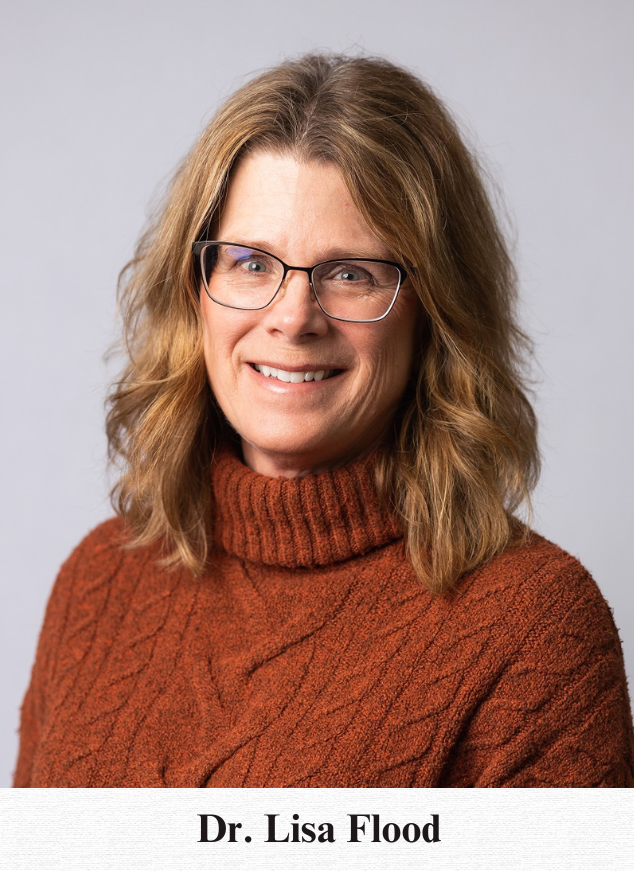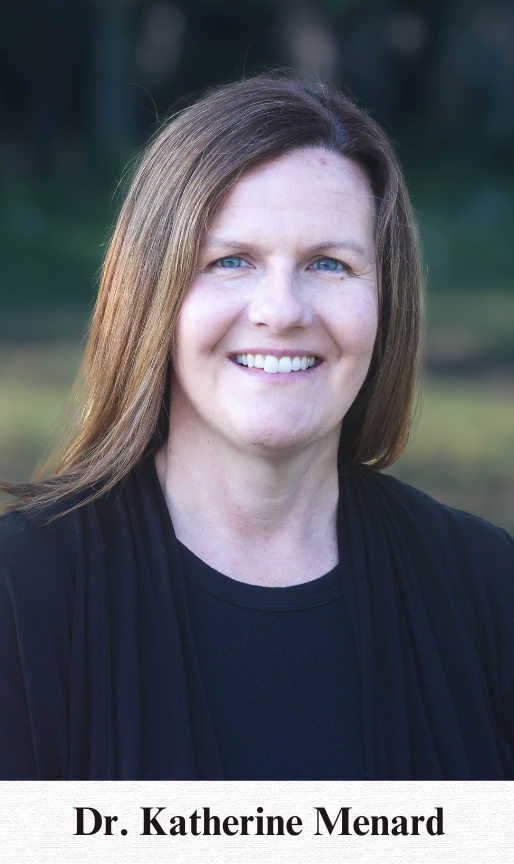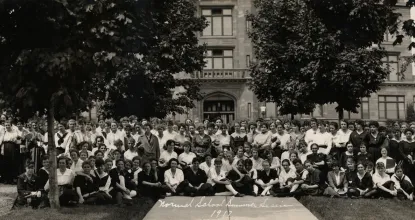By Mirabella Markham
It was Florence Nightingale who founded the practice of nursing in the nineteenth century during her service in the Crimean War. Since then, her training model for healing others has been adopted by hospitals in both the United States and around the globe. As the practice of nursing garnered its own body of knowledge and research it has since moved into academia and is being taught through programs much like Northern Michigan University’s.
Northern’s nursing program has its roots laid directly in the community. It is one of the few academic departments that has a relationship to the well-being of those living in and around Marquette. St. Luke’s School of Nursing, an educational program connected to Northern Michigan College, was where many of Northern’s students obtained three years of training in nursing. It was established in 1898 beginning with only one student, Mary Munn. The last cohort of nurses from St. Luke’s Hospital graduated in 1968.
Students at Northern were able to participate in studying pre-professional nursing as early as 1939. Martha Hatch was employed as Northern’s first women's health nurse in 1942. She was born in Minnesota in 1899 and moved to Marquette in 1934. She resigned the same year to take on a new position for the licensed practical nurse program which started during World War II to tackle the nation's shortage of medical help.
Before Northern officially developed its nursing department, courses were provided through the Women's Job Corps which acquired grants from Washington to get more women involved with the workforce. In 1966, the Michigan Nurses Association was setting out to improve the state's nursing education. Under their recommendation, Northern Michigan University began to develop its own baccalaureate in nursing. The goal of the new department was to provide more nurses to both the Upper Peninsula and the nation, alongside improving their quality of care and education. Northern’s Nursing department saw unanimous approval to begin its nursing curriculum in March of 1969 from the NMU Board of Control. The school of nursing at NMU started with three faculty members and thirty-five students, the founding faculty being Margaret Rettig, the dean and department head, Taisey Crouch, and Lulu Ervast.
Dubbed one of NMU’s first of 35 baccalaureate nursing students, Dr. Elmer Moisio was a nurse who played an important role in shaping Northern’s modern nursing program. Born in Newberry in 1946, Moisio received his diploma from the St. Luke’s Hospital School of Nursing in 1967. Moisio is considered a trailblazer. As a male nurse in the 20th century, Moisio broke the stereotype of nursing as being a women's profession. He earned his B.S. in 1971 from Northern’s nursing program. Moisio continued his nursing education at Lake Superior State College in Sault Ste. Marie, MI. There, he studied psychiatric nursing and learned how to instruct students in clinical nursing practices. During that time, Moisio continued to work as a nurse around the Marquette area as a staff nurse, clinical nurse, and instructor for the Helen Newberry Hospital and their Division of Services for the Mentally Ill.

In 1974, St. Luke’s School of Nursing was absorbed by NMU. Moisio returned to school in Dekalb, Illinois, to receive his Master's in Community Health Nursing from Northern Illinois University. That same year, he was an assistant professor at the College of Scholastica where he taught various nursing courses on family and community health, and supervised students during their clinical training in Duluth, Minnesota. Beginning in July 1977 and continuing to 1980, Moisio served as the Program Director of the Newberry Regional Mental Health Center in the Developmental Services Division. Moisio reentered the academic field as a student in Lansing at Michigan State University and earned his Ph.D. in Administrative Adult and Continuing Education in 1987.
Moisio returned to Northern in 1988 as a professor and the head of the nursing department. During his professional career at NMU, Moisio continued Northern’s nursing achievements by participating in the planning for new science buildings and remodeling the McClintock building to better accommodate the department. Moisio was an active member of Northern’s community and made sure that their programs were available off-campus in the Hancock, Iron Mountain, and Sault Ste. Marie areas, including recruitment and advising visits. In 1999, Moisio obtained funding from the dean of nursing, Betty J. Hill, to support Moisio’s local research into the self-care practices of Finnish and Swedish Immigrants in Luce County in the 1920s. NMU students helped with research and compiled a video of their findings. The research was interested in answering questions about life in Newberry in the 1920s and how those families took care of themselves.
During the 1980s, Northern’s nursing program worked for national academic recognition. Margaret Rettig announced the nursing program's first six-year accreditation in 1981 for its four-year baccalaureate degree program, awarded by the Nursing Accrediting Commission (NLNAC). In 1985, Northern celebrated the initiation of the first graduate program in nursing in the Upper Peninsula, an undertaking that was spearheaded by Dr. Marion Olson. She was born in Nebraska which is also where she graduated with her nursing diploma and baccalaureate of nursing from the University of Nebraska. Olson received her Master’s in Nursing and Psychology from the University of Iowa and taught there for 12 years. She obtained her doctorate in psychology from UCLA, where she stayed for two years as an instructor.
Olson traveled to Hawaii and Micronesia to provide workshops on nursing and after the bombing of Pearl Harbor, was classified as an essential civilian. She started working with the Red Cross in the cadet core. Olson moved to Marquette in 1982 with plans of retirement but she was still listed on the National Nursing Administration’s consultant list. She continued to work, now through NMU, writing grant proposals and teaching psychology and nursing courses in Escanaba to help associate degree nurses get their baccalaureate degrees. In 1984, she became a full-time professor in between her work as a consultant. NMU hired Olson to get the graduate program off the ground and she wrote a successful grant proposal to the U.S Public Health and Human Services. The initial graduate program had a focus on nursing service administration. Later, a family nurse practitioner program replaced this program and adult health clinical nurse specialist tracks in 2014. The doctoral program remains the only doctorate program on Northern’s campus.
Northern’s nursing department is under continual reevaluation, as the science and practice of nursing is a field that is moving alongside the growth of technology and the world’s rapidly changing needs.
Dr. Lisa Flood is a member of Northern’s faculty who has been privy to many of Northern’s challenges and changes. Born in Durand Michigan, Flood’s family moved to Marquette when she was only one year old. Her father worked for Northern in the early 1960s, and after the birth of her two brothers, they moved to Southern Indiana. After five years in Indiana, Flood’s family moved to Clare, Michigan, which she considers her hometown. She began her studies in higher education at Central Michigan University, and after learning more about the specifics of her career path (and her love for the U.P), she transferred to Northern Michigan University in the fall of 1980.

She finished her BSN in 1983 and began working as a nurse's aide at the Marquette General Hospital. After multiple interviews for job openings downstate, Flood chose to stay in Marquette and accepted an RN position at the hospital. Flood finished her Master's in adult health at Northern in 1988, and her thesis director Dr. Elmer Moisio offered her a one-semester teaching assignment. She enjoyed teaching so much that she never returned to the hospital full-time, remaining contingent for eleven thirteen years, splitting time between NMU and the hospital.
In the modern medical field, Flood has been doing research related to immersive virtual reality as a tool for teaching and developing empathy. Through a new software program at Northern, nursing students can experience what it’s like to be a patient with Alzheimer’s, a patient who is dying, or a patient going through a gender transition. Utilizing the best of modern medical equipment and technology, in 2005-2006, Northern students were given access to a full-scale simulation lab. The lab is equipped with life-like mannequins that faculty can manipulate for students to experience a wide range of patient care scenarios and practice complex skills. In 2012, with the success of the lab among students and faculty, a full-scale simulation center was built with six rooms split into different nursing specialties allowing for multiple simulation experiences across the lifespan from infants to adults.
Flood was awarded her Doctorate of Nursing Practices in 2008 from Oakland University, the first program of its kind in the State of Michigan. During her doctoral education, Flood experienced numerous distance education technologies (interactive TV, virtual meetings, and asynchronous online courses) that helped prepare her for distance teaching in the isolated academic environment during the coronavirus pandemic. For three years, Flood was the teaching and learning scholar for the Center of Teaching and Learning on Northern’s campus where she helped lead professional development projects for new and experienced faculty including offerings related to inclusivity and educational awareness. Flood co-led the nursing department through a successful national re-accreditation in 2021 which was accomplished virtually. Northern’s post-COVID nursing program has been focused on supporting mental health needs, which Flood, alongside Dr. Katherine Menard, has been working to raise awareness and meet the needs of students and practicing nurses.

Katherine Menard, the active department head since 2023, was born in Negaunee, MI. After graduating from high school Menard knew she wanted to be a physician. She attended Northern for one year where she was a freshman fellow paired with two nursing faculty; Kathleen Thompson and Mary Ellen Powers to assist in one of their research projects. After her parents allowed Menard to leave the Upper Peninsula for school, she went to Central Michigan University for a year, and while she was there, realized that she enjoyed the faculty at NMU. Completing the nursing program at NMU, Menard graduated in 2003 and began teaching at Northern. After graduating with her BSN, Menard moved to the Lower Peninsula of Michigan where she graduated with a Master’s of Science in Nursing from Eastern Michigan University with a focus on teaching and adult health in 2008. She returned to the Upper Peninsula to teach at Northern and fell in love with it all over again. To continue her work in education, Menard studied at the University of Wisconsin’s Ph.D. program and graduated in 2014. More recently, in 2023, she graduated with a post-master's certificate in psych mental health as a nurse practitioner, following the trend of mental health care after the Covid-19 pandemic.

One of the more popular initiatives to improve the well-being of students and faculty is the visiting Wild Pups program. One nurse at Northern, Michelle Andriachhi, was interested in animal-assisted therapy (AAT) and received her certificate at Oakland by nursing in this practice. Initially, six dogs owned by several nurses were trained to be a part of this project. The first Wild Pups meeting in the Lydia M. Olson library proved to be wildly successful, as 400 students came to interact with these dogs. Since then, the nursing department has received grant funding to continue to grow the program. Now members of the Marquette community have been integrated into Northern’s community as the now 20-plus dogs involved in the program come from Marquette citizens.
